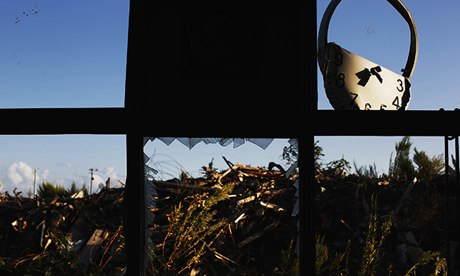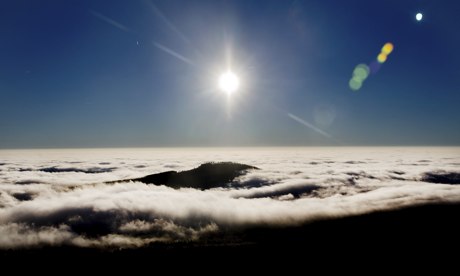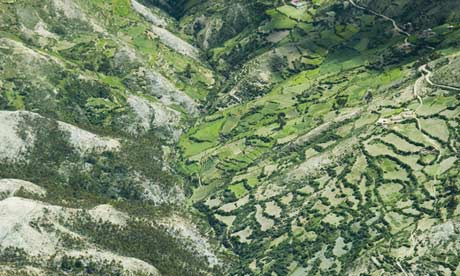 Nearly three years after a major earthquake, tsunami and nuclear radiation leak devastated coastal and inland areas of Japan's Fukushima prefecture, 175 miles north-east of Tokyo, Namie has become a silent town of ghosts and absent lives.
Nearly three years after a major earthquake, tsunami and nuclear radiation leak devastated coastal and inland areas of Japan's Fukushima prefecture, 175 miles north-east of Tokyo, Namie has become a silent town of ghosts and absent lives.
Namie's 21,000 residents remain evacuated because of continuing high radiation levels, the product of the March 2011 disaster at the Fukushima Daiichi nuclear power station, six miles to the south. Homes, shops and streets are deserted except for the occasional police patrol or checkpoint.
Fukushima ghost towns struggle to recover amid high radiation levels
Planet likely to warm by 4C by 2100, scientists warn
 Temperature rises resulting from unchecked climate change will be at the severe end of those projected, according to a new scientific study.
Temperature rises resulting from unchecked climate change will be at the severe end of those projected, according to a new scientific study.
The scientist leading the research said that unless emissions of greenhouse gases were cut, the planet would heat up by a minimum of 4C by 2100, twice the level the world's governments deem dangerous.
EPA’s system of tracking pesticides harmful to honeybees, critics say
The honeybees that pollinate one-third of Americans’ daily diet are dying, and in the eyes of some environmentalists, one culprit may be a decades-old Environmental Protection Agency system.
The system, called “conditional registration,” is essentially a way to get pesticides on the market quickly. But to environmentalists and some experts, it has become too loose, letting potentially dangerous pesticides on the market, and letting some stay there too long.
Pennsylvania Supreme Court Says It’s Unconstitutional For Gas Companies to Frack Wherever They Want
 Some major parts of Pennsylvania’s two-year-old Marcellus Shale drilling law are unconstitutional, the state’s Supreme Court decided Thursday.
Some major parts of Pennsylvania’s two-year-old Marcellus Shale drilling law are unconstitutional, the state’s Supreme Court decided Thursday.
As the Pittsburgh Post-Gazette reports, the court voted 4 – 2 that a provision that allowing natural gas companies to drill anywhere, regardless of local zoning laws, was unconstitutional. Seven municipalities had challenged the shale drilling law, known as Act 13, that required “drilling, waste pits and pipelines be allowed in every zoning district, including residential districts, as long as certain buffers are observed.”
Oil industry 'devastating' for Amazon communities, warns UN
 Indigenous people in Peru have suffered "devastating consequences" as a result of extractive industries in the Amazon rainforest, according to the United Nations' Special Rapporteur on Indigenous Rights.
Indigenous people in Peru have suffered "devastating consequences" as a result of extractive industries in the Amazon rainforest, according to the United Nations' Special Rapporteur on Indigenous Rights.
During a week-long trip to the country, James Anaya visited indigenous communities in Loreto, an Amazon region which has been heavily contaminated over the last 40 years by oil companies. In particular he visited an oil concession known as Block 192 (formerly Block 1AB).
UN says 'e-waste' problem growing fast
 The mountain of refrigerators, cellphones, TV sets and other electrical waste disposed of annually worldwide is forecast to grow by a third by 2017, mostly in developing nations, according to a U.N. study released Sunday.
The mountain of refrigerators, cellphones, TV sets and other electrical waste disposed of annually worldwide is forecast to grow by a third by 2017, mostly in developing nations, according to a U.N. study released Sunday.
E-waste — defined as anything with a battery or a cord — can pose a big problem because it often contains substances that are harmful to humans and the environment if not properly disposed of. On the other hand, some of it can be profitably recycled.
NOAA: Arctic sea-ice melt linked to extreme summer weather
 A growing body of evidence demonstrates a link between the melting of Arctic sea ice and worsening summer heat waves and other extreme weather in the United States and elsewhere in the world, leading scientists said Thursday.
A growing body of evidence demonstrates a link between the melting of Arctic sea ice and worsening summer heat waves and other extreme weather in the United States and elsewhere in the world, leading scientists said Thursday.
“The Arctic is not like Vegas. What happens in the Arctic does not stay in the Arctic,” said Howard Epstein, a University of Virginia environmental scientist who’s part of a team that produced the Arctic Report Card for the federal National Oceanic and Atmospheric Administration.
More Articles...
Page 54 of 202

 Environmental Glance
Environmental Glance






























